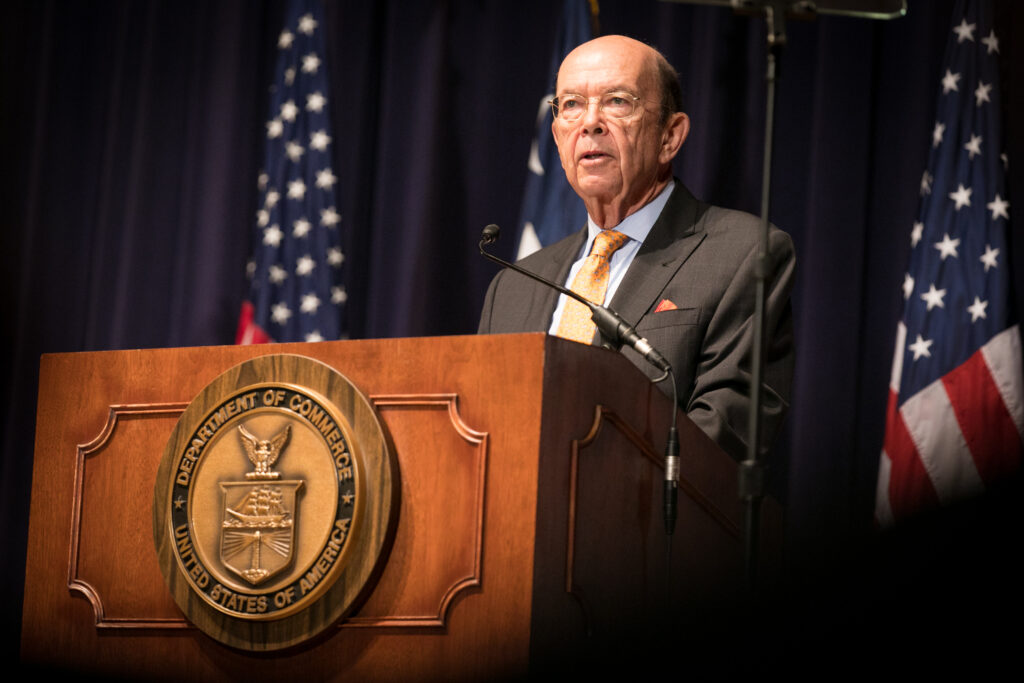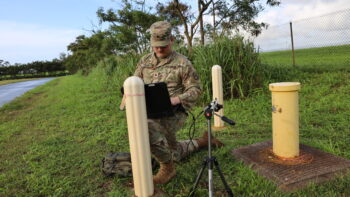
Commerce Secretary Wilbur Ross
WASHINGTON: The cardinals of Congress have stymied Trump Administration efforts to transfer responsibility for civil space monitoring from DoD to the Commerce Department (DoC). Appropriators rejected Commerce’s bid for funds in the fiscal 2020 spending deal.
“This is a full-on disaster,” said one senior industry executive close to the effort. “It means no change from the status quo, which will ultimately harm US leadership in space.”
As Breaking D readers know, DoD and the Air Force — which currently has the responsibility for tracking satellites and dangerous space junk — have been eager to shift some of the burden to DoC, in part because space is becoming increasingly crowded with the number of commercial and foreign operators booming. Of course, DoD will keep control of its own space situational awareness (SSA) assets necessary to its newly dubbed “space domain awareness” mission, although it will now be the job of the newly created Space Force.

Currently the 18th Air Force tracks all satellites and debris, and provides warnings of possible collisions to military, civil, commercial and foreign operators.
“It’s really about an enduring DoC-DoD partnership vice throwing things over the fence,” one government official told me today. Indeed, DoD and DoC already have been working closely to prepare for the shift. For example, as I reported back in May, the Air Force is sharing its experimental cloud-based SSA data library, called the Unified Data Library, with DoC.
While there continues to be some disagreement between congressional Republicans and Democrats on whether DoC is the right organization to take over the mission (some Dems would prefer the Federal Aviation Administration), they are united on one thing. They are still miffed at DoC Secretary Wilbur Ross for snubbing their requests to testify on the department’s budget, including the plan for a new office to handle space tracking and warning operators about potential collisions, according to a number of sources.
“This was an own goal,” the industry exec explained, an “avoidable failure” on the part of the administration.
The 2020 spending agreement makes this clear, rejecting DoC’s $10 million ask and instead adding only $500,000 (that’s right five hundred thousand dollars) to its 2019 budget level of $2.3 million for the Office of Space Commerce led by Kevin O’Connell.
It further makes reference to the section of the Senate Appropriations Committee (SAC) report that smacked DoC for failing to respond positively to SAC’s requests to testify publicly on the proposed shift.
“The Committee twice invited senior officials from the Department to offer public testimony before the Committee on the proposal to establish an Office of Space Commerce within the Office of the Secretary, among other topics. Unfortunately, both of the individuals refused to testify, and the public testimony that was offered did not quell the concerns of the Committee, specifically regarding the proposed transfer of space traffic management responsibilities from the Department of Defense to the DOC,” the Senate report complains.
The 2020 spending deal keeps Senate appropriations report language that demands a study of the office’s planned reorganization designed to implement President Donald Trump’s Space Policy Directive-3 (SPD-3). SPD-3 orders the transfer of civil space tracking authority and lays the groundwork for a new US space traffic management (STM) regime. SPD-3 further envisions the US as leading STM efforts of other nations by setting an example for others to follow.
House appropriators, in their version of the Commerce, Justice and Science spending bill, rejected the transfer outright.
The reorganization would combine the Office of Space Commerce with the Commercial Remote Sensing Regulatory Affairs office, and elevate the new entity from under management by the National Oceanic and Atmospheric Agency (NOAA) to Ross’s office.
Under the language, DoC is mandated to contract with the National Academy of Public Administration for an independent study of the proposed transfer of authorities from DoD. The study is to include:
- an assessment of which department or agency and entity within the department or agency is best suited for responsibility for space traffic management;
- any statutory, regulatory or licensing authorities necessary to facilitate such a transfer;
- funding implications, including infrastructure and personnel costs;
- consultation with appropriate officials from the Departments of Defense, Commerce, and Transportation, NASA, the Director of National Intelligence, other relevant Federal agencies, industry, and other stakeholders; and
- data integrity, information technology, and national security considerations.
Further, while the Senate would have given DoC a year to complete the study, the 2020 spending agreement shortens that to only six months. It also makes clear that the $500,000 in extra funds for the Office of Space Commerce is to be spent on the study.
“Changing how the United States approaches space traffic management at the governmental level was never going to be easy,” said Victoria Samson, DC office director at Secure World Foundation. “Having said that, … this appropriation will allow for a study to look at what the best way of shifting around STM responsibilities may be, including looking at authorities and funding needed — important questions that should be answered before making the switch official.”
Israel signs $583 million deal to sell Barak air defense to Slovakia
The agreement marks the latest air defense export by Israel to Europe, despite its ongoing war in Gaza.
























